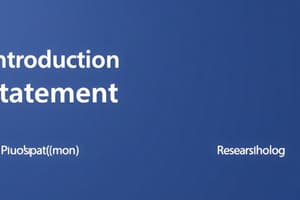Podcast
Questions and Answers
What does the correlative aspect of research indicate?
What does the correlative aspect of research indicate?
- It shows the methodology used in a study.
- It highlights the ethical considerations of the research.
- It summarizes the recommendations for future research.
- It indicates the relationship between variables and their direction. (correct)
Which component of a research study typically contains the findings that answer the study's objectives?
Which component of a research study typically contains the findings that answer the study's objectives?
- Delineating Factors
- Methods
- Objective
- Major Findings (correct)
What essential information can be found in the Methods column of a research matrix?
What essential information can be found in the Methods column of a research matrix?
- The theoretical framework of the study.
- The cultural context of the research participants.
- The literature review supporting the study.
- The data collection instruments and procedures used. (correct)
Where are the variables typically found in a research study?
Where are the variables typically found in a research study?
What is described in the Recommendation section of a research study?
What is described in the Recommendation section of a research study?
What is the primary function of research design?
What is the primary function of research design?
Which principle emphasizes the importance of keeping promises and agreements in research?
Which principle emphasizes the importance of keeping promises and agreements in research?
What should be avoided to ensure careful research practices?
What should be avoided to ensure careful research practices?
Why is openness important in research?
Why is openness important in research?
What is a key component of respecting intellectual property in research?
What is a key component of respecting intellectual property in research?
What does confidentiality in research safeguard?
What does confidentiality in research safeguard?
What should researchers do to maintain good records?
What should researchers do to maintain good records?
What is the importance of acknowledging contributions in research?
What is the importance of acknowledging contributions in research?
What is one requirement for a true experimental design?
What is one requirement for a true experimental design?
Which of the following best describes the role of the research problem in determining research design?
Which of the following best describes the role of the research problem in determining research design?
What type of design involves measuring subjects both before and after an intervention?
What type of design involves measuring subjects both before and after an intervention?
What does Ex Post Facto design imply?
What does Ex Post Facto design imply?
Which of the following correctly describes the use of tables and graphs in quantitative research?
Which of the following correctly describes the use of tables and graphs in quantitative research?
What does it mean if a study assumes a normal population distribution?
What does it mean if a study assumes a normal population distribution?
What is a characteristic of using a repeatable method in research?
What is a characteristic of using a repeatable method in research?
What is the primary purpose of experimental research?
What is the primary purpose of experimental research?
What type of qualitative research focuses on discovering a new theory during data collection?
What type of qualitative research focuses on discovering a new theory during data collection?
Which of the following is NOT an advantage of qualitative research?
Which of the following is NOT an advantage of qualitative research?
What aspect does phenomenology primarily seek to understand?
What aspect does phenomenology primarily seek to understand?
In which qualitative research type is a long-term study of a person or group emphasized?
In which qualitative research type is a long-term study of a person or group emphasized?
Ethnography is primarily concerned with studying which of the following?
Ethnography is primarily concerned with studying which of the following?
How does qualitative research generally approach its subject matter?
How does qualitative research generally approach its subject matter?
Which aspect is emphasized by phenomenological research methodologies?
Which aspect is emphasized by phenomenological research methodologies?
What does the naturalistic approach in qualitative research promote?
What does the naturalistic approach in qualitative research promote?
What does objectivity in research primarily refer to?
What does objectivity in research primarily refer to?
What is the primary purpose of a literature review in the research process?
What is the primary purpose of a literature review in the research process?
Which of the following is NOT a step in formulating a hypothesis?
Which of the following is NOT a step in formulating a hypothesis?
What is meant by 'replicable' in the context of research procedures?
What is meant by 'replicable' in the context of research procedures?
According to the content, what does conceptualizing your research involve?
According to the content, what does conceptualizing your research involve?
What is the role of defining variables in hypothesis formulation?
What is the role of defining variables in hypothesis formulation?
What is an essential aspect of carefully processing ideas in research?
What is an essential aspect of carefully processing ideas in research?
Which step is considered the most difficult part of research, according to Aurini et al.?
Which step is considered the most difficult part of research, according to Aurini et al.?
Flashcards are hidden until you start studying
Study Notes
Research Process Overview
- Research consists of a series of steps: conceptualization, literature review, hypothesis formulation, research design, data collection, and reporting findings.
- A clear purpose statement outlines the study's objectives and intentions.
Step 1: Conceptualization
- Involves identifying the research topic and problem, deemed the most difficult stage.
- Emphasizes thorough discovery and reading to enhance understanding of the subject matter.
Step 2: Literature Review
- Critical analysis of existing scholarly articles and knowledge.
- Essential for informing the research and positioning it within the current academic landscape.
Step 3: Hypothesis Formulation
- A hypothesis is an informed prediction about the relationship between variables.
- Variables must be clearly defined, quantifiable, and measurable.
- Conduct an in-depth examination of these variables to confirm the hypothesis.
Step 4: Research Design
- A structured blueprint guiding how to collect research materials and data.
- Design impacts methodology selection, ensuring the procedural integrity for replicability.
Step 5: Data Collection
- Practical challenges may arise during the data gathering process.
- Familiarity with effective data collection strategies is crucial for successful research.
Step 6: Preparing Research Results
- Involves interpreting and reporting research findings while ensuring ethical practices are observed.
- Emphasizes confidentiality and respect for intellectual property.
Types of Qualitative Research
- Grounded Theory: Development of a new theory during data collection and analysis.
- Case Study: In-depth exploration of an individual, group, or situation within real-world contexts.
- Ethnography: Study of cultural groups to understand their behaviors and practices.
- Phenomenology: Focus on understanding individuals' experiences and meanings related to specific events.
Advantages of Qualitative Research
- Provides a deep understanding of human behavior in natural settings.
- Respects individual perspectives and subjective meanings attached to experiences.
- Combines both researcher insight and participant experiences for richer data interpretation.
Types of Quantitative Research
- Experimental Design: Tests hypotheses through manipulated conditions.
- True Experimental Design: Random selection ensures objectivity and causal relationship examination.
- Correlational Design: Analyzes relationships and directions between variables.
- Survey Design: Gathers data on attitudes and opinions from large populations.
- Ex Post Facto Design: Observational study “after the fact” to explore existing conditions.
Research Matrix Components
- Objective: States the aim of the research study.
- Variables: Identifies factors considered in the research.
- Methods: Details the research design, locations, respondents, instruments, procedures, and analysis techniques.
- Major Findings: Summarizes key results and their implications related to the study's objective.
- Recommendations: Suggests areas for further exploration based on research findings.
Studying That Suits You
Use AI to generate personalized quizzes and flashcards to suit your learning preferences.




